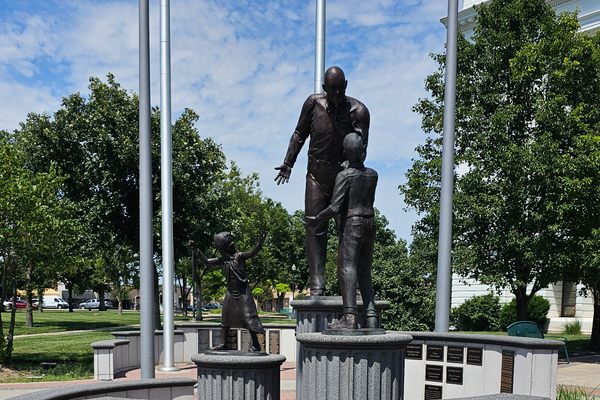Who can you count on when the chips are down? For one rural city in Kansas, the answer is easy. In the town square of Great Bend, visitors can find a bronze statue dedicated to Jack Kilby, the inventor of the microchip, who once called Great Bend home.
Jack St. Clair Kilby was born in 1923 in Jefferson City, Missouri. His father, Hubert, became president of the Kansas Power Company, a rural utility company in Great Bend, and moved his family there when Kilby was in third grade. Kilby was a popular and well-rounded student, on the basketball team and choir, but his primary fascination was engineering. Kilby shared his father’s interest in utility lines and wires, and became interested in ham radio operations after his father used one to manage emergency operations during a 1937 Kansas ice storm. He built his first transmitter at Great Bend High School, and after attending engineering school at the University of Illinois, World War II broke out. He would be stationed in India, repairing radio transmitters.
Kilby eventually left Kansas, first for a company in Wisconsin, and then to Dallas, where he began working for Texas Instruments. At the time the electronics industry relied on the transistor, a breakthrough technology that nevertheless had too many pieces to reliably and cheaply mass produce. The hunt was on for an integrated circuit, and many inventors began work on the challenge. Soon after joining TI in 1958, Kilby was left alone in the semiconductor laboratory, the only engineer without vacation time. He began to sketch an idea for an integrated circuit that leveraged TI’s investment in silicon. On July 24, 1958, he sketched out the idea of the silicon chip. The patent would be issued six years later, in June 1964.
Kilby would go on to file for more than 60 patents in his career, generally related to practical applications for the microchip processor. Possibly most famously to math students in the late 20th century, this would include the pocket calculator. He would be inducted into the National Inventors Hall of Fame, and in December 2000, he would be honored with the Nobel Prize in Physics, but lacking the thirst for attention associated with many other great inventors, he remained somewhat anonymous in his lifetime.
After the Nobel Prize was awarded, a committee was formed in Great Bend to honor the town’s native son, led by local lawyer Glenn Opie, who was reminded of his time growing up with Kilby after watching his Nobel Prize ceremony on television. Seeing a chance to honor Kilby and support education in his town, Opie worked for over a decade to raise funds and awareness of the project, first by hosting Jack Kilby Day in Great Bend, and then through plans for a permanent memorial after Kilby’s 2005 passing.
Jack Kilby Memorial Plaza was dedicated on April 28, 2012, in the town square (which is also named for the great inventor). The centerpiece of the memorial is a bronze sculpture entitled The Gift, designed by local artist Chet Cale. The gentle giant Kilby, who stood 6’ 7” in life, is depicted standing over two children. He is handing his gift, a microchip, to a young boy, while a young girl nearby points to the stars, as a nod to Kansas’ motto, “Ad Astra Per Aspera.” In keeping with Kilby’s humility and values, the goal is not to honor the man, but rather to encourage children to pursue education through hard work and dedication.
The tradition of Jack Kilby Day also continues annually, with a day of STEM education for Great Bend’s high school students. As Opie wrote, “It’s pride that we should all have, knowing Jack Kilby grew up here in Great Bend.”

